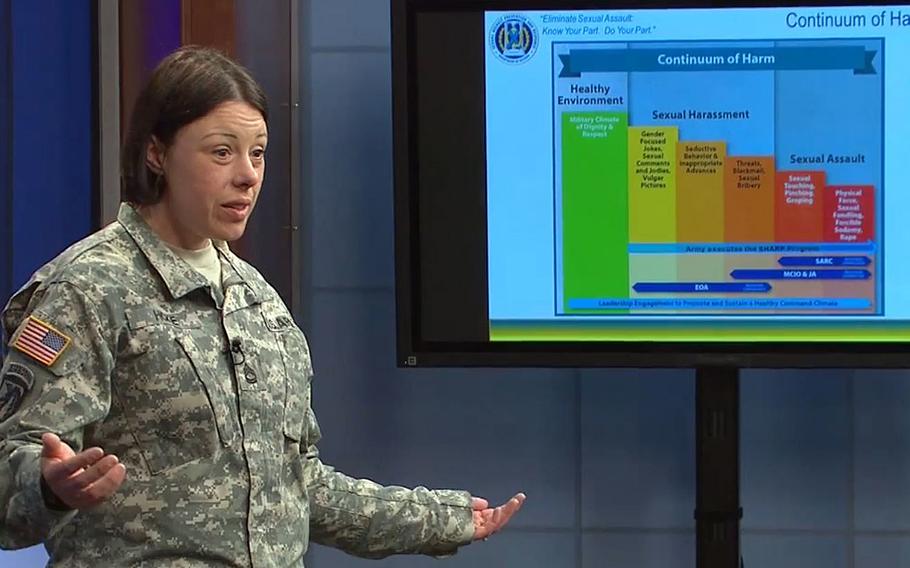
A video screen grab shows a military sexual assault response and prevention coordinator for Fort Meade, Md., giving a lecture on April 16, 2015. (Defense Department)
More than 6,100 sexual assaults were reported to the Department of Defense in fiscal 2014, up 11 percent from the previous year and 70 percent from fiscal 2012, according to its annual report to Congress. Officials believe the jump indicates better confidence in the military’s ability to address the crimes, not an increase in attacks, but concerns about retaliation remain.
The Pentagon in December announced it believes about 20,000 servicemembers were sexually assaulted in 2014, based on an anonymous survey conducted by the Rand Corp. On Friday, in the Pentagon’s annual report to Congress, DOD officials said 6,131 of those sexual assaults were reported to the military.
The gap between the estimated number of assaults and the number of reports has long troubled Pentagon officials, members of Congress and victim advocates. But the increase in reporting and decrease in estimated assaults means the military is making “considerable progress,” Brad Carson, acting undersecretary of defense for personnel and readiness, wrote in the report.
In a Pentagon briefing Friday, Defense Secretary Ash Carter said, “Our commitment to stopping sexual assault cannot cease. … We won’t let up.”
Officials believe about 25 percent of troops who experienced unwanted sexual contact in fiscal 2014 reported the crime, the highest percentage ever recorded in the military. The DOD believes only about 11 percent of victims reported the attacks in fiscal 2012.
Carter wrote in a memo to military chiefs that he believes the data will help the military to care for victims and prevent assaults, but that it also “demonstrates our resolve to consider and employ new solutions that have been attempted nowhere else.”
Still, he wrote, he is concerned with significant numbers of victims saying they were retaliated against after making a report.
Rear Adm. Rick Snyder, director of the Navy’s 21st Century Sailor Office, said he is also concerned about retaliation and how it might impact future reporting.
Snyder said some of the negative impacts that sailors reported might not fall under the Uniform Code of Military Justice definition of retaliation, but the Navy hopes to understand all the potential negative consequences and address them by better educating the fleet.
In his memo accompanying the report, Carter said the military services must:
Work to improve their organizational culture to address sexual harassment, sexual assault and reporting-related retaliation. Evaluate treatment programs to ensure victims of both genders are getting the help they need. Develop a strategy to prevent retaliation against troops who report. Use one prevalence survey for feedback. The services must submit their plans for the first three initiatives by Sept. 1.
hlad.jennifer@stripes.com Twitter: @jhlad